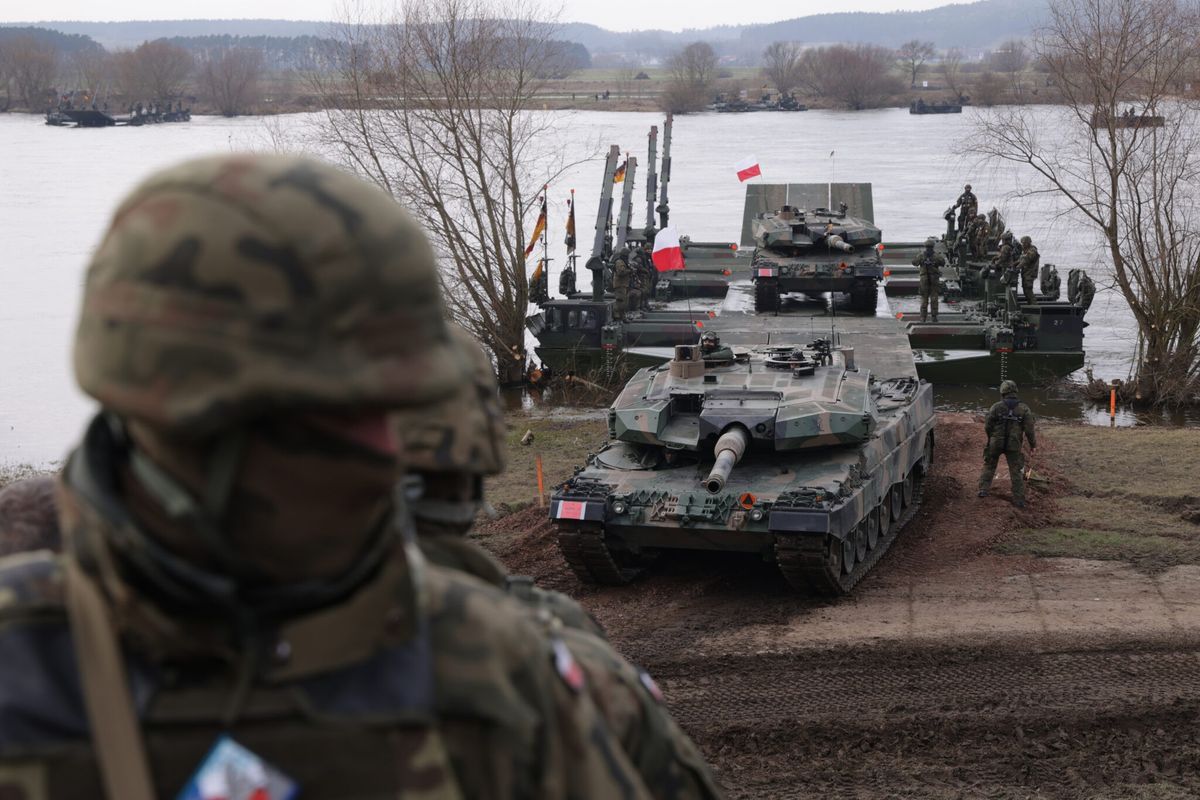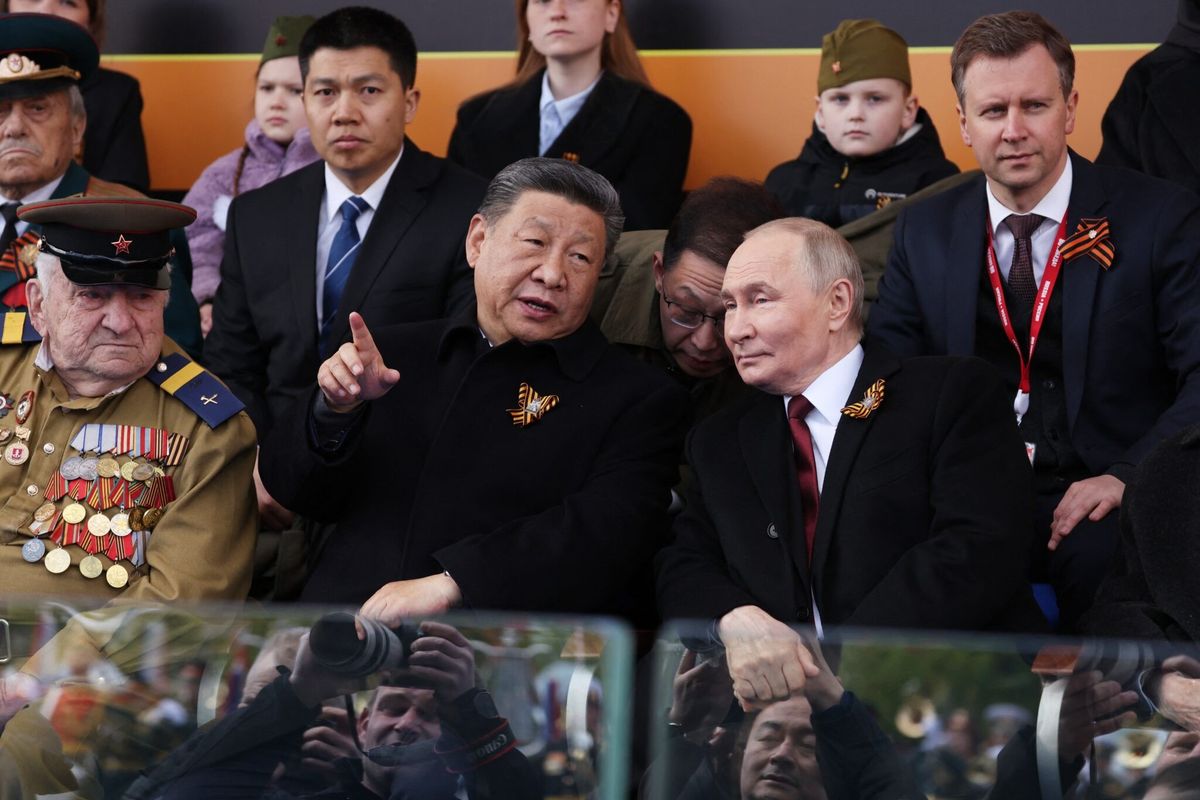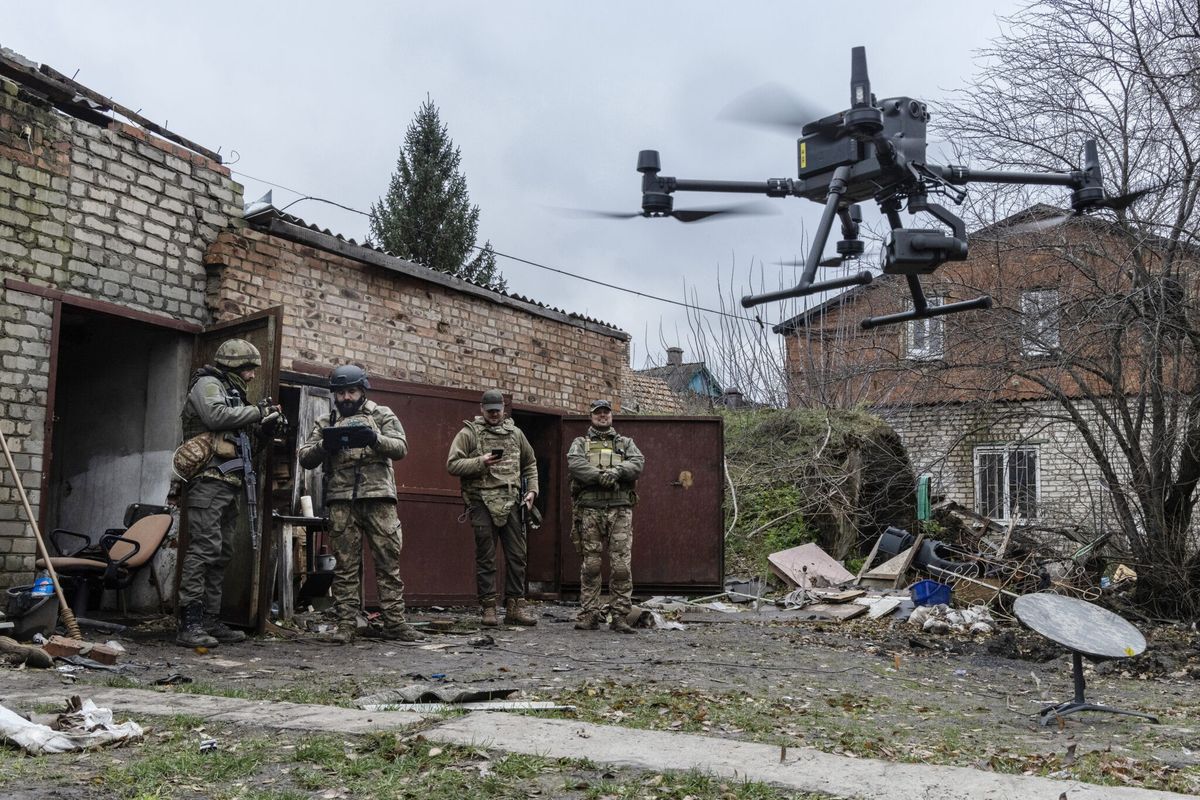SUBSCRIBER+ EXCLUSIVE REPORTING - For Ukraine, the first anniversary of Russia’s invasion offered reasons for hope. The country had thwarted the initial assault on Kyiv, routed Russian forces in Kharkiv and Kherson, inflicted staggering levels of Russian casualties and made a global hero of the comedian-turned-president Volodymyr Zelensky. The courage and prowess of the Ukrainians, along with Russia’s brutality, had accomplished the reverse of what Vladimir Putin had intended: NATO was galvanized, and Ukraine won a huge outlay of financial and military aid. One year ago, a Ukrainian counteroffensive loomed, and some Western officials and analysts suggested Putin and his “special military operation” were on the ropes.
On February 24, 2023, Zelensky marked the anniversary with a vow: "We know that 2023 will be the year of our victory!"
But the year since has brought a seeming reversal of fortunes. On the battlefield, the counteroffensive fizzled, and last week, Russia won its most significant victory in more than a year, capturing the small city of Avdiivka. The Kremlin has found multiple workarounds to Western sanctions, leaving its coffers well-stocked, and received generous supplies of weapons from Iran and North Korea. Ukraine, meanwhile, faces the possibility that American aid will soon come to an end.
If that weren’t enough, internal divisions have surfaced in Ukraine - the most public resulting in the ouster of top general Valery Zaluzhnyi - and global attention to Ukraine’s plight has been diverted by Israel’s war in Gaza.
“Many people thought Ukraine was on the verge of kicking Russia out of Ukraine entirely, and there would be a huge victory for NATO and a humiliation for Putin,” New York Times White House Correspondent David Sanger told The Cipher Brief in an interview from last weekend’s Munich Security Conference. “This is the year of Putin’s revenge. He’s doing better in Ukraine.”
Simon Shuster, author of a recently-released biography of Zelensky, says the Ukrainian leader has worried since the onset of war about holding the world’s attention. “In our first conversation after the invasion, (Zelensky) said, ‘Sooner or later - people see this war on Instagram, and sooner or later, they will scroll away,’” Shuster told NPR’s Fresh Air. More recently, Shuster spoke to aides who described meetings at which Zelensky would say, “We need a move” or “a plot twist.”
Those were terms Zelensky had used with writers on his comedy shows, meaning “a plot twist to surprise the audience, something new…to keep them watching. In the context of the invasion, he would use the same phrase, but he would mean, ‘We need a victory.’”
Two years after Russia’s invasion, Ukraine is in dire need of a “plot twist” - the positive kind. The Cipher Brief reached out to several experts and asked a basic question: How can Ukraine reverse its fortunes, in year three of the war?
Find out how private sector businesses are investing and innovating in Ukraine at The Cipher Brief’s Kyiv Economic and Security Forum. Find out more at TCBKyivForum.com
It's All About the Weapons
The first answer was unanimous - and it’s beyond Zelensky’s control: Ukraine must secure the aid from Washington.
“There is no substitute for U.S. aid if you want to avoid a collapse of Ukrainian frontlines,” Dmitri Alperovitch, Executive Chairman at Silverado Policy Accelerator and a Senior Fellow at the Harvard Kennedy School, told The Cipher Brief.
“(Germany’s) Chancellor Scholz said if the U.S. does not pass this aid package, Ukraine will lose,” Alperovitch said. “That’s actually a very realistic assessment.”
Last week’s collapse at Avdiivka provided a stark example of the problem. While Russia poured in reinforcements and pounded the city from the air, Ukrainian soldiers rationed ammunition and commanders complained of poor air defenses.
“We're already hearing about the shortage of ammunition, and that is very real,” Evelyn Farkas, Executive Director of the McCain Institute, told The Cipher Brief. Avdiivka, Farkas said, showed that “the Ukrainians are already feeling the pinch, and we are already seeing the difference that that shortage makes.”
Former CIA director and Cipher Brief expert Gen. David Petraeus said that whatever happens in the House of Representatives, where the $60 billion package for Ukraine faces deep opposition, will likely dominate the near- and long-term course of the war. “The big question now is, when will the assistance be coming from the United States?” Petraeus told The Cipher Brief last week. “There’s a real concern that Ukraine could begin to run out of air defense interceptors or artillery.”
Lt. General Ben Hodges, who was the top U.S. Army commander in Europe from 2014 to 2018, was an early critic of the Biden Administration for being too slow to deliver weapons systems to Ukraine. Two years on, he told The Cipher Brief that it’s not too late to alter the course of the war.
Ukraine needs “a clear declaration from the U.S…that it is in our strategic interest that Ukraine wins this war and that we will do everything necessary to help them win,” Gen. Hodges said. He emphasized the need for more long-range precision weapons “that will destroy Russian headquarters, Russian logistics, and Russian artillery,” noting that “every square meter of Russian-occupied Ukraine” lies within range of US ATACMS (a ballistic missile system) and German Taurus cruise missiles.
In Search of a “Plan B”
At a NATO meeting two weeks ago, National Security Adviser Jake Sullivan said there was no “Plan B” when it came to U.S. military support for Ukraine; the focus, he said, was focused on getting the current aid package through Congress.
That said, policymakers in other NATO countries and Ukraine itself are planning for the worst, and experts who spoke to The Cipher Brief said it was imperative for Ukraine to consider other options.
Kurt Volker, a former U.S. Ambassador to NATO, said he had been heartened by a new urgency among Europeans at the Munich conference.
“They are talking about creating greater investment funds for the defense industry so that they can guarantee procurement, which will allow industry to invest in order to ramp up European defense production,” Volker told The Cipher Brief. “That’s a positive step right there.”
Volker and others noted a recent spike in defense spending among several NATO countries. In 2016, only 3 NATO allies were spending 2% or more of GDP on defense; the number today is 18.
“Things are trending in the right way in terms of Europe improving its own capabilities,” Volker said.
“At the end of the day, the Europeans have come through,” Gen. Petraeus said, highlighting a recent 50-billion Euro ($54 billion) Ukraine aid package from the EU.
In Ukraine itself, “Plan B” involves fast-tracking domestic weapons production, but that won’t help in the short term - and some argue that the country needs more western help on its weapons assembly line.
“The Ukrainians are doing the best they can to manufacture equipment,” Farkas said, but she suggested American and European companies offer technical know-how, or an arrangement by which “the Europeans could step into the breach…and use some of the money that they approved to buy weaponry, and provide that weaponry to Ukraine. They could buy it from us. We are somewhat limited by our industrial base, the ability to manufacture fast enough, but these things are surmountable if we put ourselves on a war footing.”
Wanted: Fresh troops
Among many difficult truths for Ukraine, two years into the war, is that the recent setbacks came while the flows of Western military and financial aid were in place. And another glaring need has little to do with the debates in Brussels and Washington: Ukraine needs more soldiers.
Asked about the ouster of Zaluzhnyi, the top Ukrainian commander, Gen. Petraeus said Ukrainian soldiers and commanders have more urgent worries. “I think the troops are actually much more concerned about replacements, about getting their units back up to strength…some of them have been in near-constant combat for approaching two years now.”
Troop shortages played a role in the loss of Avdiivka. Multiple reports suggested that Russia was willing to expend tens of thousands of additional soldiers in the battle, while the Ukrainian decision to withdraw was made to avoid further losses on its side.
Zelensky has resisted pleas for a new mobilization despite pleas from his frontline commanders. A recent Washington Post report described warnings of an “acute shortage” of soldiers, and officers increasingly angry that such calls were going unanswered.
A battalion commander identified only as Oleksandr said of his troops, "They need to be replaced by someone. But there is no one to replace them, so they sit there longer and longer; their morale drops, they get sick or suffer frostbite. They are running on empty.
“Why can’t we replace them? Because we don’t have people; nobody comes to join the army…Those who [already] knew that they should go have already [all joined]."
Serhii, a platoon commander near Avdiivka, said "people are exhausted both morally and physically. It’s very hard, the weather conditions, the constant shelling. They have a great impact on the human psyche.”
On the other side of the battle lines, Russia holds the advantages of sheer numbers and the ability of a dictatorship to do as it pleases. The Kremlin has recruited tens of thousands of soldiers from prisons, paid other recruits more than double the average wage, and accepted a staggering toll of dead and wounded soldiers. And it has muzzled any dissent that the casualties might cause.
Gen. Hodges said of the Kremlin strategy: “They’ll continue to feed unlucky Russian soldiers into the meat grinder and try to convey that they can do this forever.” He added that it was imperative for Ukraine to “fix the personnel system” and bring more soldiers to the front.
“Ukraine has over 2 million women and men of military age, but the system is not designed to recruit and attract them. If they were confident that they’d be properly trained and equipped and put into good units before being sent into combat, and if they were sure that the government would take care of their families if something happened to them, then the many thousands of Ukrainian women and men of military age would flock to the armed forces. This…means tough political decisions by Kyiv.”
The year ahead
If “counteroffensive” was the buzzword a year ago, today the often-heard terms are “hold and build” - and “assymetrical war.”
The first suggests Ukraine will pause on any major offensives, concentrating instead on retaining the territory it has (hence “hold”) and using the interim to fortify its ranks and weapons stocks as best as it can (“build”).
“Assymetrical war” can mean many things for Ukraine, but fundamentally it refers to strikes against Russian targets away from the frontlines. The Ukrainians have already been doing this to powerful effect - most notably in its drone attacks against Russian targets in Crimea and the Black Sea (in the last month Ukraine has sunk two Russian warships), but also in strikes against facilities inside Russia itself.
Many experts said this was an area where Ukraine might at a minimum keep the Russians off balance, and do so without expending large amounts of ammunition or manpower.
Asked where Ukraine’s best chances lie in 2024, Farkas said, “I think it's mostly the asymmetric. Using missiles to continue to knock the Russian Black Sea Fleet out of Russian and Ukrainian Black Sea waters…There are things that the Ukrainians can do to continue to get the Russians off balance and to erode their capabilities.”
Gen. Petraeus agreed. While Russia holds “the strategic initiative at least on the ground,” he said the world should “keep in mind” what Ukraine has already achieved in the Black Sea.
“Their maritime drones have forced the Russians to withdraw from the important port of Sevastopol in occupied Crimea for the first time in a couple of centuries,” he said, and damaged at least one third of Russia’s vaunted Black Sea Fleet.
“These are largely irreplaceable for Russia,” Petraeus said. “That’s a very significant achievement. We do sometimes overlook that.”
A “Navalny Effect”?
Changes in the narrative of war - or “plot twists” - can come from unexpected quarters. When news came Friday that Russia’s best-known dissident Alexei Navalny had died, many thought it might be a moment to galvanize the West.
Certainly that was a wish shared by Navalny’s widow, Yulia Navalnaya, and by Zelensky himself. “This is Russia’s war against any rules at all,” Zelensky said of Navalny’s death. “But how long will the world let Russia be like this? This is the main question today.”
William Browder, an American financier who has campaigned for decades against human rights abuses in Russia, said Navalny’s death might make a difference.
“This is a classic good-versus-evil story,” Browder told The New York Times. “These types of symbols and stories have a resonance that goes so far beyond the petty squabbles of the world we live in.”
Former U.S. Ambassador to Russia Michael McFaul said Navalny’s death had already galvanized policymakers on both sides of the Atlantic.
“There was no doubt in my interactions with members of Congress, former American officials and European officials, that the horrific murder of Navalny was making it much more difficult to ignore the brutality of Putin,” McFaul said.
The Times’ Sanger was skeptical, noting that President Biden had said in 2021 that Navalny’s death would bring “serious consequences” for Russia. “We haven’t heard what those would be. And frankly, at this moment, name a sanction that hasn’t been enacted or evaded.”
The way forward
How else to change the narrative, or find a “plot twist” that might benefit Ukraine?
In the wake of Navalny’s death, some have repeated calls to unfreeze Russian assets and get those funds to the Ukrainians.
Volker argued that NATO nations should fast-track talks to bring Ukraine into the alliance and clarify how best to defend Ukraine until that happens.
The former Ukrainian Finance Minister Natalie Jaresko, now an executive at Ernst and Young, said that while the military aid questions are addressed, attention must also be paid to Ukraine’s economic recovery.
“This requires a priority focus on the return and reintegration of the over 6 million Ukrainians living abroad and 5 million internally displaced persons to their homes, and support for our veterans, who have given so much to our country,” she told The Cipher Brief.
Jaresko said Ukraine will need help when it comes to everything from housing to education, and in particular, to the repair of infrastructure that has been badly damaged by Russia’s assault.
Finally, nearly all the experts stressed the importance of hammering home a message to the rest of the world.
“I believe this is a long-term war of attrition,” Alperovitch said, “and we have to prepare our societies that there is not going to be a quick victory here, and that support for Ukraine will have to continue on for some time if you do not want the front line to collapse and really, the city of Kyiv itself and much of Ukraine to be put into mortal risk yet again.”
“There’s no illusion that Russia would stop in Ukraine,” Gen. Petraeus said. “There’s keen awareness that Vladimir Putin would go on to Moldova and Lithuania, and others in the Baltic States. So, there is a seriousness of purpose that is very palpable.”
Asked whether the war would still be raging one year from now, Gen. Hodges was clear.
“We will still be talking about this in February 2025,” he said. “But the conversation could and should be much better if the U.S. and the EU commit to Ukraine winning.”
Read more expert-driven national security insights, perspective and analysis in The Cipher Brief













